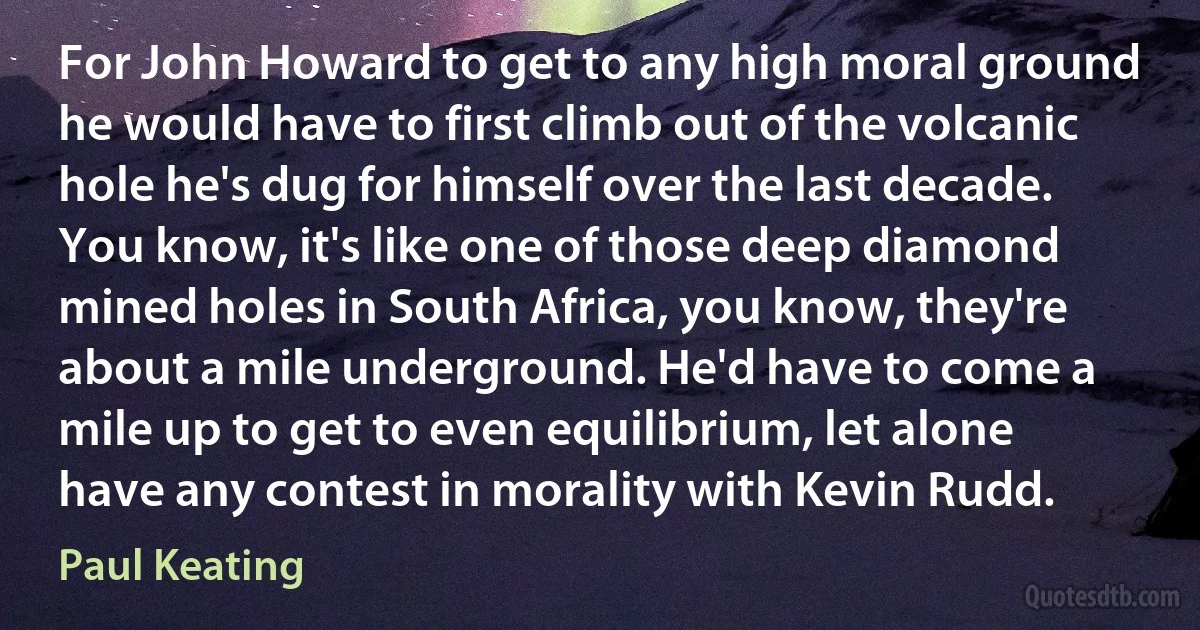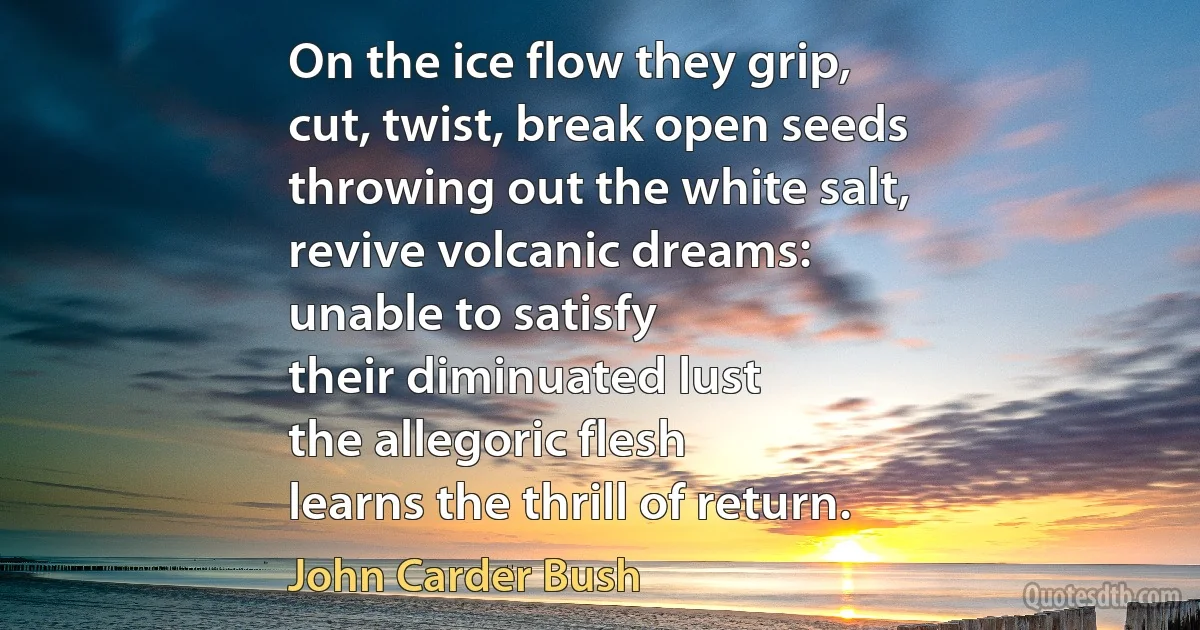Volcanic Quotes
Life is also busy transporting and overturning the soils of earth, the stones, and the minerals. The miles-long drifts of sea kelp that float along our coasts may carry hundreds of tons of volcanic boulders held in their roots. I have followed these streams of life over 300 km, and seen them strand on granite beaches, throwing their boulders up on a 9,000 year old pile of basalt, all the hundreds of tons of which were carried there by kelp.

Bill Mollison
In that strange island Iceland,-burst up, the geologists say, by fire from the bottom of the sea; a wild land of barrenness and lava; swallowed many months of every year in black tempests, yet with a wild gleaming beauty in summertime; towering up there, stern and grim, in the North Ocean with its snow jokuls, roaring geysers, sulphur-pools and horrid volcanic chasms, like the waste chaotic battle-field of Frost and Fire;-where of all places we least looked for Literature or written memorials, the record of these things was written down.

Thomas Carlyle
[Fred] Spoor's observations are truly startling, In all species of the genus Homo, the inner ear structure is indistinguishable from that of modern humans. Similarly, in all species of Australopithecus, the semicircular canals look like those of apes. Does this mean that the australopithecines moved about as apes do-that is, quadrupedally? The structure of the pelvis and lower limbs speaks against this conclusion. So does a remarkable discovery my mother made in 1976: a trail of very humanlike footprints made in a layer of volcanic ash some 3.75 million years ago.

Richard Leakey
Some revolutions are inevitable. There are moral eruptions, just as the outbreak of volcanoes are physical eruptions. When the chemical combinations which produce them are complete, the volcanic eruptions burst forth, just as revolutions do when the moral factors are in the right state. In order to foresee them the trend of ideas must be understandingly observed.

Napoleon Bonaparte
In another place, this learned geographer (Strabo), in alluding to the tradition that Sicily had been separated by a convulsion from Italy, remarks, that at present the land near the sea in those parts was rarely shaken by earthquakes, since there were now open orifices whereby fire and ignited matters and waters escaped; but formerly, when the volcanoes of Etna, the Lipari Islands, Ischia, and others, were closed up, the imprisoned fire and wind might have produced far more vehement movements. The doctrine, therefore, that volcanoes are safety valves, and that the subterranean convulsions are probably most violent when first the volcanic energy shifts itself to a new quarter, is not modern.

Charles Lyell
They were allowed a little touch at each of the books, but only with their fingertips tonight, literature cannot bear dirty hands; first we'll have to back each volume with paper, the covers must not get dirty, nor the spines slit, books are the nation's most precious possession, books have preserved the nation's life through monopoly, pestilence, and volcanic eruption, not to mention the tons of snow that have lain over the country's widely scattered homesteads for the major part of every one of its thousand years.

Halldór Laxness
I myself have experienced the volcanic existential depths of the Greek language. It was during a performance of Medea by Tzeni Karezi at the Herod Atticus theatre in Athens, when she was pleading to the callous Jason to take pity on her and she used the word ' splachniasou'. 'Pity' is too weak a word to describe the emotional and psychological depths ' splachniasou' expresses. 'Splachna 'is the part of the body where a woman carries her unborn children, the very root of ontological existence. How deep can you get!

Angelique Rockas
Probably even more than the architecture I'd be drawn to landscape. That's my first love, landscape... All kinds of landscape, if it's not cluttered up and vandalised. Yesterday we went out to Blenheim, and I love the flatness and the trees. I like all kinds. And where I'm from, the central valley of Virginia, is not one of the most exciting landscapes in the world, but it's one of the most beautiful. It's very beautiful because it has everything. It has mountains, there are streams, there are fields, beautiful trees. And architecture sits very well in it... And I've always lived in the south of Italy, because it's more excitable. It's volcanic. The land affects people naturally, that's part of the characteristics, for me, of a people, in a sense.

Cy Twombly
Anger clearly has its proper place at work, which is neither wholly absent nor ever present. The manager who is an emotional blank is just as hard to work for as the volcanic boss, and both can do great harm by setting an unhelpful example for what kind of emotional expression is expected and accepted.

Julian Baggini
We're constantly re-evaluating the potential for life. We're finding it where we didn't think it could exist, such as volcanic vents and other extreme conditions like under arctic ice. We're finding life in these incredibly harsh and dynamic conditions, so we're having to re-evaluate our own ideas of what's possible on this planet alone.

Joe Rogan
Then came the journey up to London through Birmingham and the Black District, another lesson, which needed much more to be rightly felt. The plunge into darkness lurid with flames; the sense of unknown horror in this weird gloom which then existed nowhere else, and never had existed before, except in volcanic craters; the violent contrast between this dense, smoky, impenetrable darkness, and the soft green charm that one glided into, as one emerged - the revelation of an unknown society of the pit - made a boy uncomfortable, though he had no idea that Karl Marx was standing there waiting for him, and that sooner or later the process of education would have to deal with Karl Marx much more than with Professor Bowen of Harvard College or his Satanic free-trade majesty John Stuart Mill.

Henry Adams

![Cesalpino, a celebrated botanist, conceived that fossil shells had been left on the land by the sea, and had concreted into stone during the consolidation the soil; and in the following year (1597), Simeone Majoli went still farther, and coinciding for the most part with views of Cesalpino, suggested that the shells and matter of the Veronese, and other districts, might have cast up, upon the land, by volcanic explosions, like those gave rise, in 1538, to Monte Nuovo, near Puzzuoli.- This hint was the first imperfect attempt to connect the position fossil shells with the agency of volcanoes, a system more fully developed by Hooke, [Antonio] Lazzaro Moro, Hutton, and other writers. Two years afterwards, Imperati advocated the animal origin of fossilized shells, yet admitted that stones could vegetate by force of 'an internal principle,' and, as evidence of this, he referred to the teeth of fish, and spines of echini found petrified. (Charles Lyell)](https://cdn.quotesdtb.com/img/quotes_images_webp/10/charles-lyell-agency-animal-476710.webp)

